Mathematics
Mathematics at The Alderton Infant School
Intent
At Alderton Infant School we recognise the importance of mathematics as it enables pupils to access the wider world. Mathematics is an interconnected subject and we aim to develop a deep conceptual understanding and mastery of mathematical concepts which they can apply in problem-solving and practical tasks. An important element of this is learning and memorising key number facts such as number bonds, step counting and related multiplication and division facts . We enhance our mathematics provision by providing opportunities for pupils to use and apply these learned skills in other areas of the curriculum.
Implementation
Our lessons are focussed on developing the ‘Dimensions of Depth’ at Key Stage One which are interdependent and together make effective maths lessons:
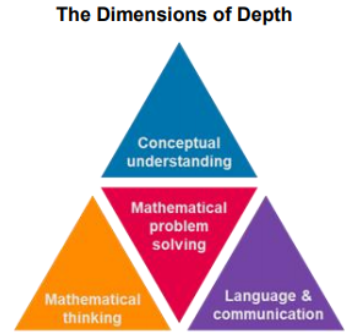
Language and Communication
Mathematics has a precise formal language, which is distinct from everyday language. At Alderton we explicitly teach accurate mathematical language through the sharing of key vocabulary and opportunities to rehearse the use of this language in full sentences to ensure pupils have the language required to be competent and confident mathematicians. We expect pupils to respond to questions, justify choices and explain their thinking. We wish to ensure all pupils have the confidence to develop their reasoning skills through the skilful use of challenging, open-ended questions and investigations.
Conceptual understanding
We have embedded the development of Concrete, Pictorial and Abstract representations in our planning and policies which enables pupils to make explicit links and connections in their learning as they progress throughout the school. This approach allows pupils to deepen their understanding by representing concepts using objects and pictures and, more abstractly, with words and symbols. We expect pupils to use appropriate pictorial and concrete representations as scaffolds for explanations of their mathematical thinking. We ensure conceptual variation is used to explore the different representations of the same mathematical idea which promotes connections between areas of mathematics and allows pupils to make sense of increasingly complex problems.
Mathematical thinking
We encourage pupils to approach problems in an organised and systematic way. Pupils are asked to deepen their understanding by giving an example or conjecturing about what they notice. Over time pupils will forge connections between different mathematical ideas, and will begin to identify familiar structures and patterns in unfamiliar contexts and problems. We ask pupils to evaluate their work and their understanding with the expectation that they will become increasingly proficient at solving problems over time.
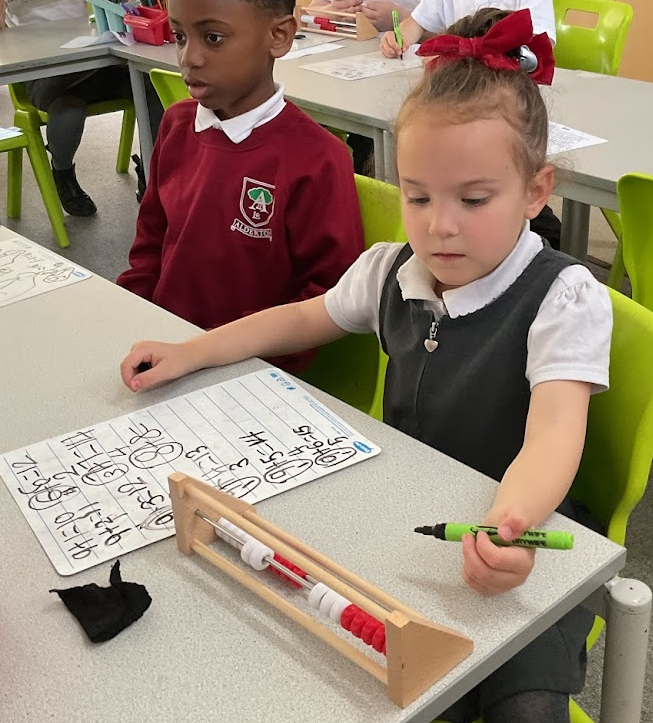
Curriculum Summary
We have adopted a curriculum which;
- covers the National Curriculum for Key Stage One and Early Years Statutory Framework for our Reception pupils but also details the skills, knowledge and understanding we wish pupils to develop in both the long term and medium term plan for each year group.
- is sequential and is designed to build on previous learning towards a clear end point.
- blocked into areas of learning which are revisited over time to help achieve ‘mastery’.
- for Key Stage One, blocked Place Value and Addition and Subtraction in the beginning of the Autumn term so pupils have a strong basis for later concepts such as multiplication and division.
- for Reception pupils start with early number skills and Mathematics is often separated into concepts and specific vocabulary as an approach to support all learners. They follow the Mastering Number Programme.
How we teach mathematics at Alderton Infant School
- Pupils are taught using a ‘mastery’ approach which ensures the majority of pupils ‘stay together’ and planning includes opportunities for pupils who have grasped a mathematical concept to be exposed to varied fluency activities which develop their understanding through rich and sophisticated problems rather than being accelerated through new content.
- Planning includes Greater Depth opportunities which may encourage them to reason more precisely, deal with more complex problems, suggest multiple strategies and approaches to solving calculations, and compare different approaches, taking efficiency into account.
- We have a commitment to providing an accessible curriculum and to develop each child as a learner. We aim to close gaps in attainment by being ambitious for our most vulnerable pupils and removing barriers so they can achieve their best.
- Pupils have access to concrete manipulatives. Concrete, Pictorial and Abstract representations are included in teaching and modelling of problems for pupils where relevant to their age and stage of development as outlined in our policies.
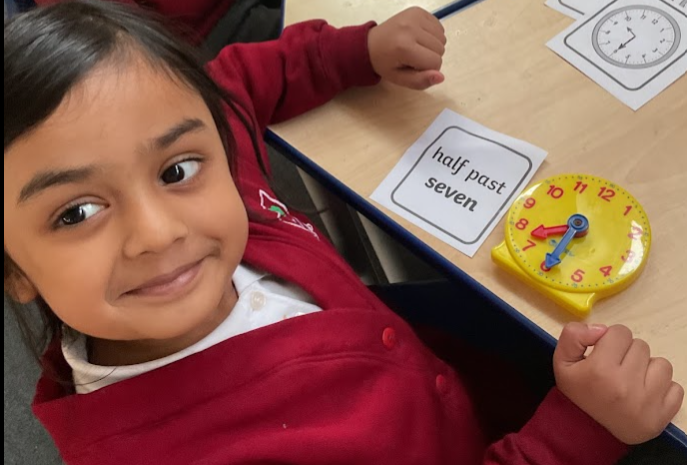
Early Years Foundation Stage
In Reception:
- Planning delivers content from the Statutory Framework and takes into consideration pupils' varied starting points upon joining our school.
- Reception pupils are taught mathematics daily for approximately 15 minutes using Mastering Number. Opportunities to practise key skills are provided through continuous provision and additional enhancement activities.
- Our curriculum also provides rich opportunities for children to develop their spatial reasoning skills across all areas of mathematics including shape, space and measure. A shape or concept is taught per week e.g. side, circle, face, cube, longer, as this allows pupils to learn the vocabulary and definition and apply this to their learning.
- Pupils are taught through direct instruction, play and exploration activities as well as adult led follow up activities to ensure the concept has been learned and applied. Throughout our mathematics provision pupils are encouraged to look for patterns and relationships and spot connections.
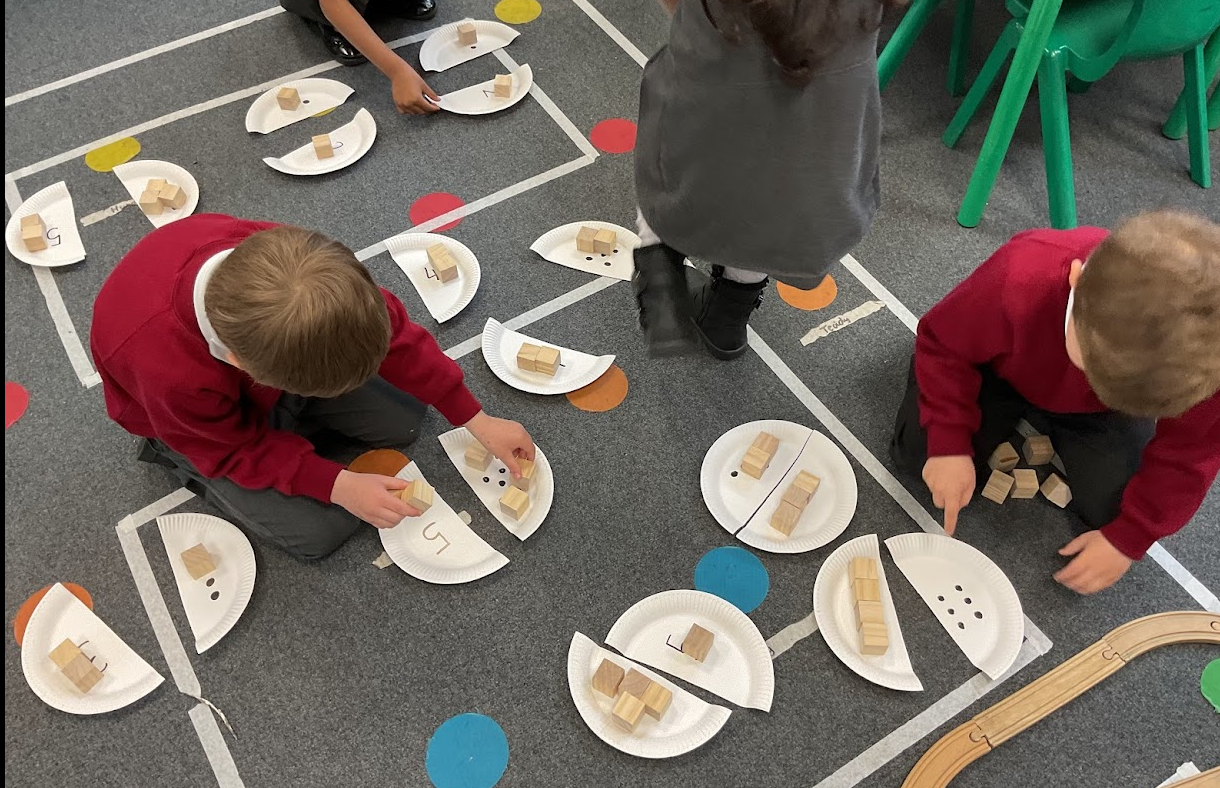
Early Years Foundation Stage: End of Year Assessment
At the end of Reception teachers will assess children against the Early Learning Goals of Number and Numerical Patterns respectively. This includes if they can count confidently and have a deep understanding of the numbers to 10, the relationships between them and the patterns within those numbers. We also provide opportunities for pupils to verbally count beyond 20, compare quantities up to 10 and explore and represent patterns within numbers up to 10.
Key Stage One
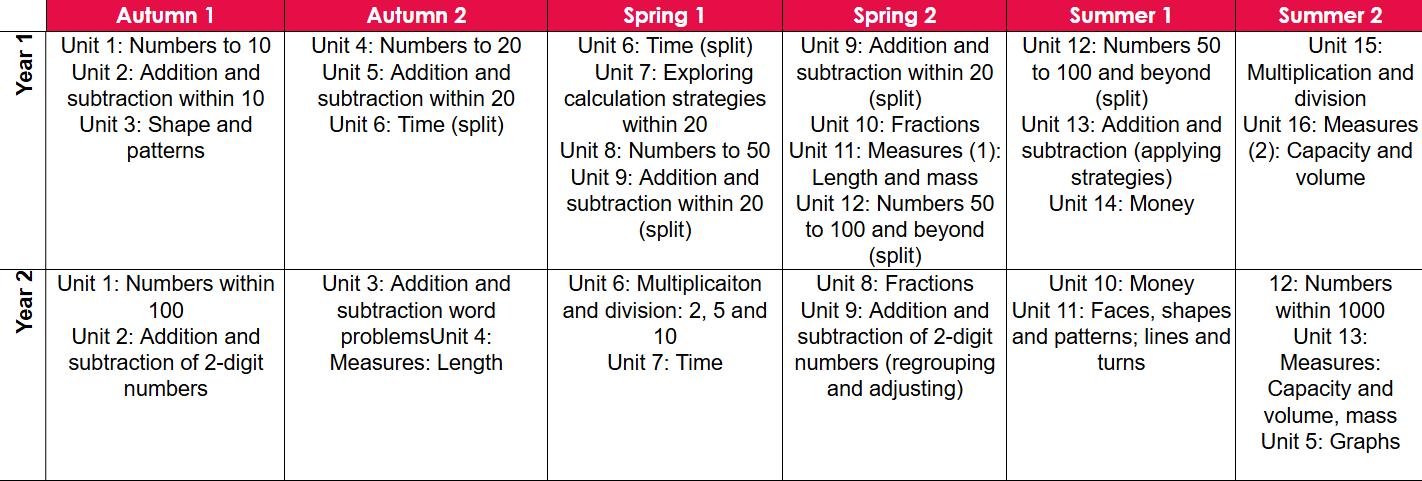
In Years One and Two Mathematics is taught 5 times a week. There are typically 4 lessons which are 1 hour in duration using My Mastery. There is also a fifth 15 minute lesson which is used for the following as appropriate:
- undertaking pre assessment
- pre teaching or addressing misconceptions about a concept or method in response to assessment
- practising quick recall facts to be used in transitions within the unit
We follow the National Curriculum Programmes of Study which comprises the following strands:
- Number- place value, addition and subtraction, multiplication and division, fractions
- Measurement
- Geometry- properties of shapes, position and direction
- Statistics (Year 2 only)
We also follow ‘Mastering Number’ which is delivered four times a week for approximately 10 minutes.
Key Stage One: Assessment
Pupils in Year Two are assessed against the Non-Statutory Teacher Assessment Framework as ‘Working Towards’ ‘Working At’ or ‘Greater Depth’.

Parental Involvement
- Parents are invited to attend a Mathematics Workshop which gives an outline as to the purpose of our curriculum, including the core principles. The parents see the learning taking place in school, the expectations upon the pupils in meeting the curriculum and also have the opportunity to explore manipulatives and strategies their children will be using in line with our Calculation Policy and Curriculum documents. The session typically lasts an hour and demonstrates the standard of work and advises parents of the typical misconceptions and difficulties pupils may face and some possible solutions to these. This information is also shared via email to all parents in that year group.
- Parents are also invited to attend Parent mornings which run one morning a week from 8:45-8:55. In Key Stage One Mathematics meetings are held every other week. In Reception these are run every third week. The intended outcome is for pupils to share and consolidate their learning as well as allowing parents to see the practical and current practises of the school so they can support their child at home
Homework
- Parents/ carers for each year group have weekly notices sent home which inform them of the key vocabulary and ideas their children have been using in mathematics.
Policies
Useful Websites
Manipulatives to help children solve problems
https://mathsbot.com/manipulativeMenu
Home learning and Support
https://www.thenational.academy/pupils/years
https://www.bbc.co.uk/cbeebies/grownups/help-your-child-with-maths
www.bbc.co.uk/bitesize/primary
https://whiterosemaths.com/homelearning/
https://nrich.maths.org/parents
